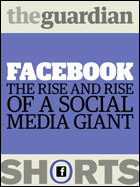If even Google and Facebook are struggling with the pace of change - what chance media companies?
Yesterday I read Eric Jackson’s article suggesting that there are a generation of internet businesses who are already struggling to adapt to the changing dynamic of the web, and that Google and Facebook may be about to face the threat that has left companies like MySpace, AOL and Yahoo! sidelined as also-rans on the web.
“Here’s Why Google and Facebook Might Completely Disappear in the Next 5 Years” includes some hyperbolic phrases like “We will never have Web 3.0, because the Web’s dead” littered throughout the piece that I don’t buy into, but the idea that Google’s clumsy moves into social show a one-trick pony struggling to adapt, or Facebook’s purchase of Instagram outlines how the company feels threatened by mobile is an intriguing one.
Yesterday I also saw Peter Kirwan’s post for The Media Briefing - “Why developers will build the future of the content industry”. I was struck by the contrast in timescales being outlined in the two articles. Jackson talks of the half-life between internet generations shrinking - Facebook only had a couple of years as the master of social before being threatened by mobile, Google had many years dominating search before social began eating into their share of activity on the web.
In Kirwan’s post, however, he quotes Suw Charman-Anderson predicting it might still be 10 or 15 years before someone from a non-editorial background might be making the key decisions at a big news organisation. It is difficult to think of anybody across the whole of the UK media landscape in a senior role who has a purely digital background, but you see plenty of people responsible for the digital side of businesses with purely legacy media experience. In appointing Fiona Romeo as Director, Exhibitions and Programmes from a digital role at the National Maritime Museum, it seems that even the arts and heritage sector is moving faster than the media in this respect.
Kirwan specifically addressed the Guardian in his piece, and probably the closest the company has to an area where digital is truly setting the agenda of a service is with n0tice, who yesterday launched a new Facebook component to the service. Matt McAlister has blogged about how that project has managed to remain start-up sized whilst being incubated by a bigger media entity.
That is one of the reasons I have been so fascinated with developments at Johnston Press. Whatever your opinion of Ashley Highfield’s tenure at the BBC or Microsoft, he is clearly attempting to make a radical change there. It has certainly disrupted newsrooms - and newsagents - and is worth keeping an eye on. If Plan A for regional and local press has for so long seemed to be simply watching the tanker slowly slip into the sea, then a gamble on Plan B can’t be much less viable.
Reading Eric Jackson and Peter Kirwan’s leaves an awkward question hanging in the air though. If Google and Facebook are really struggling with the impact of disruption to their business models from changes in trends on the internet, where does that leave media companies, many of whom haven’t really got to grips with web 1.0 yet?
“Facebook: The rise and rise of a social media giant”
Edited by Martin Belam
In February 2004, whilst at Harvard, Mark Zuckerberg and friends created “The Facebook”. What started as just a website for one university has become one of the dominant forces on the internet in the early 21st century. The simple idea of connecting people together into networks of friends sharing their personal details has made Mark Zuckerberg, on paper at least, one of the wealthiest men on the planet. This is the story of the rise and rise of Facebook, as told in six years of original journalism, writing and comment in the pages of the Guardian and the Observer.
“Facebook: The rise and rise of a social media giant” - £2.56 for Kindle & £2.99 for iBooks.
